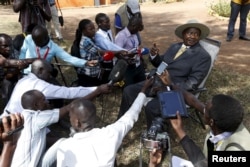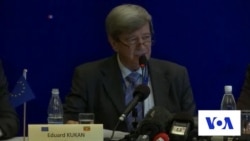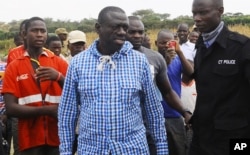Uganda's electoral commission has named incumbent President Yoweri Museveni the winner in Thursday's election, but the main opposition party is rejecting the results as fraudulent.
Mugisha Muntu, the chairman of the Forum for Democratic Change (FDC) party, said election results announced at the national tally center in Kampala were "inconsistent" with results declared at polling stations.
Muntu told VOA Saturday that the party is compiling evidence to show Ugandans and poll observers that the election was rigged in favor of Museveni.
"One thing we can say for sure, which is nothing new to our party supporters, is that the elections have been fraudulent," Muntu said.
Uganda's electoral commission said Saturday that Museveni won the election with nearly 61 percent of the vote, more than enough to secure a first-round victory. It said his strongest challenger, FDC candidate Kizza Besigye, won 35 percent.
Besigye, who was arrested while trying to hold a news conference Friday, remains under house arrest.
Questioned fairness
The European Union's election observer mission released a statement just hours before the final vote tally was due, saying the ruling National Resistance Movement's domination of the political landscape "distorted the fairness of the campaign and state actors created an intimidating atmosphere for both voters and candidates" on election day and the days following.
Chief Observer Eduard Kukan praised Ugandan voters for their commitment to the electoral process.
Many voters waited in long lines Thursday for a chance to cast their ballots, and in parts of the capital, Kampala, and Wakiso district, the vote had to be continued into Friday to make up for delays in opening the polling stations.
But Kukan criticized the Electoral Commission for failing to effectively communicate steps that would have been needed to overcome "growing tensions caused by markedly delayed delivery of the voting material."
The observer mission had already noted in an earlier statement that "state actors," or representatives of the government, were mainly to blame for a "polarized discourse and intimidating atmosphere" prior to the election.
WATCH: Related video of election observers' comments
The news of Museveni's win pleased National Resistance Movement supporters, such as 58-year-old Sarah Opondo.
“I’m very, very happy, extremely happy because I like the president. I like his ways of doing things, of handling things, he’s parental, he’s so parental to us," Opondo said.
But her view was not shared by others, such as Richard Bulamu, who supported opposition candidate Kizza Besigye of the Forum for Democratic Change party.
“I’m not really sure if the elections were free and fair. As a Ugandan, I’m not happy with the process, but, you know, in a dictatorial country, that’s what we are used to, you know … It shows the kind of country we are living in, we don’t have democracy, we don’t have freedom of speech, our social media was switched off yesterday," Bulamu said.
Uganda election criticisms
Earlier, the United States and a prominent human rights group criticized Uganda's election process, alleging undue pressure, and in some cases undue force, by security forces on opposition candidates and their supporters.
Maria Burnett, an Africa specialist for Human Rights Watch, said threats to Ugandans' human rights had been documented over the years, but in the days preceding the election, she said, "there was no hiding the brutality."
Burnett called on Ugandan security forces to respect peaceful protests and avoid excessive use of force in response to any confrontations.
Meanwhile, police spokesman Fred Enanga told The Associated Press that opposition leader Besigye had been put under house arrest to prevent further unrest after police used tear gas on his supporters outside opposition headquarters on Friday.
Police said Besigye was detained because he planned to announce election results, in violation of electoral laws.
U.S. Secretary of State John Kerry voiced concern about the detention of Besigye, and urged President Museveni to rein in his security forces.
'Call into question'
Kerry spoke on the phone with Museveni Friday, saying the police actions "call into question Uganda's commitment to a transparent and credible election process free from intimidation," the State Department said in a statement.
Kerry also urged Museveni to end the shutdown of popular social media sites and money mobile services.
The head of Uganda's Communications Commission said the social media sites were blocked for security reasons.
Museveni told Kerry, "Democracy cannot open in anarchy, and everybody should behave according to the law," the Ugandan newspaper The Daily Monitor reported.
Jill Craig in Kampala and Peter Clottey in Washington contributed to this report.










